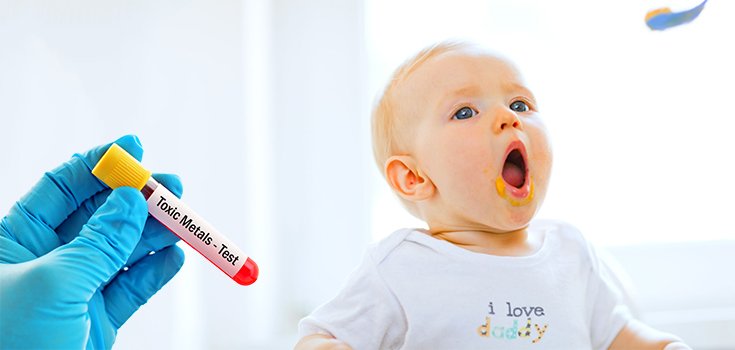Report: Baby Food Contains “Worrisome” Levels of Lead, Arsenic, Cadmium

Consumer Reports has some bad news for parents who only feed their babies organic food. In terms of arsenic, cadmium, and lead levels, organic baby foods are no better than traditional products when it comes to
Consumer Reports tested 50 baby and toddler products from retailers all over the country, including 20 that were labeled “organic.” Products made with rice had the highest levels of heavy metals, but all showed measurable levels of cadmium, inorganic arsenic, and/or lead. [2]
Of the 50 products tested, 34 contained concerning levels of heavy metals, while 15 had such high levels that a child who eats a single serving per day would face potential health problems.
How Much is too Much?
Based on their findings, Consumer Reports determined a daily number of servings a child would have to eat before he or she would truly be at-risk for health problems from exposure to heavy metals.
The authors recommend limiting the following products to 1 serving per day:
- Earth’s Best Organic Chicken & Brown Rice
- Gerber Chicken & Rice and Sprout Organic Baby Food Garden Vegetables Brown Rice with Turkey
Children should eat only a half-portion daily of Gerber Lil’ Meals White Turkey Stew With Rice & Vegetables.
Fruits and vegetables packaged for babies drew less concern from the authors, who set no daily limits for the following baby foods:
- Beech-Nut Organic Peas, Green Peas, Green Beans and Avocado
- Gerber Organic Peas, Carrots & Beets
However, Consumer Reports recommends limiting both Beach-Nut Classics Sweet Potatoes and Earth’s Best Organic Sweet Potatoes, 1st Stage, to half a serving daily.
Exposure to heavy metals is dangerous for people of all ages, but babies and toddlers are especially vulnerable because of their small stature and developing brains. One of the biggest worries among experts is the effect heavy metals can have on kids’ cognitive development. [2]
James Rogers, director of food safety research and test at Consumers Reports, noted: [2]
“They also absorb more of the heavy metals that get into their bodies than adults do.”
In the U.S., packaged baby food is a $54 billion-a-year industry, according to data from Zion Market Research. More than 90% of parents with children 3 and under reach for these foods, at least occasionally. [2]
Read: 5 Hidden Toxins Found in Baby Products
Sixteen of the products tested had “less concerning” levels of the heavy metals, according to the report, indicating that all baby food manufacturers could make their products safer if they chose to do so.
Consumer Reports said the U.S. Food and Drug Administration (FDA) told the group that it is working to finalize guidelines on inorganic arsenic in infant rice cereal by the end of 2018.
Tips for Parents

Parents shouldn’t panic about the findings in the report. The presence of heavy metals in no way guarantees a child will suffer health problems as a result of consuming them. [2]
And there are things parents can do to limit their child’s exposure to inorganic arsenic, cadmium, and lead.
- Limit your child’s infant rice cereal intake. Rice cereal is often one of the first solid foods babies eat because it’s easy to swallow and fortified with iron. But rice cereal has tested positive more than once for concerning levels of inorganic arsenic.
- Be picky about the types of rice your child eats. Brown rice contained higher levels of inorganic arsenic than white rice. High levels of inorganic arsenic were also found in rice cakes, rice cereal, and pasta. Instead, choose white basmati rice from California, India, and Pakistan. Sushi rice from the U.S. had an average of half as much inorganic arsenic as most other types.
Healthful Rice: Report Shows Rice Least Contaminated with Arsenic
- Choose snacks low in heavy metals, such as apples, unsweetened applesauce, avocados, bananas, beans, cheese, grapes, hard-boiled eggs, peaches, strawberries, and yogurt.
- Beware of fruit juices. Many brands of apple and grape juice tested positive for high levels of inorganic arsenic. Another reason to avoid fruit juices: they’re loaded with sugar and devoid of fiber.
- Minimize chocolate intake, as cocoa powder may contain cadmium and/or lead. Cocoa itself may contain more heavy metals than dark chocolate, and dark chocolate may contain more metals than milk chocolate.
- Skip the protein powders, which may contain all 3 heavy metals. Whey and egg-based powders tended to have less than plant-based ones such as soy and hemp.

Sources:
[1] USA Today
[2] CBS News

It’s all by design. This is a culling operation.